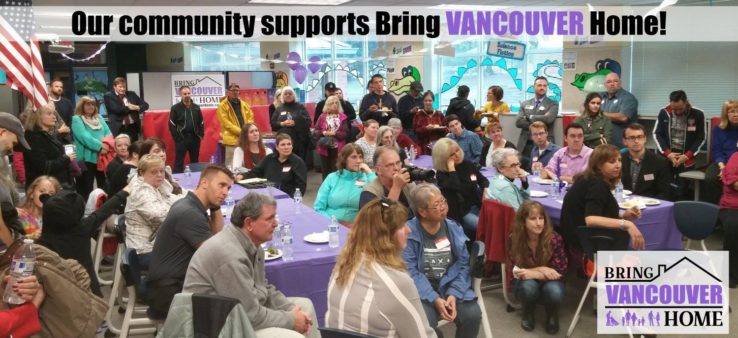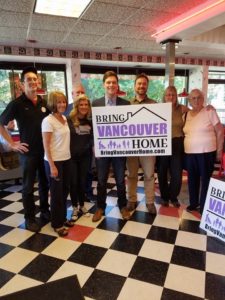Vancouver Washington Voters Approve Housing Levy, Affordable Housing Fund

On November 8, voters passed Proposition 1, a $42 million 7-year housing property tax levy that created an Affordable Housing Fund to serve very low-income families and individuals. Proposition 1 taxes Vancouver property owners 36 cents per $1,000 assessed property value, with all collected revenue dedicated to the Affordable Housing Fund. The fund will provide and preserve affordable homes for very low income households and contribute to efforts to end homelessness through collaborations with nonprofit and for-profit developers that will, with the levy funds, leverage other funding in order to maximize the amount of quality affordable housing produced over the next seven years.
Driving the campaign for Proposition 1 was the Bring Vancouver Home coalition. Led by the Council for the Homeless, the coalition includes nonprofit and for-profit housing developers, homeless service providers, mental health service providers, health care providers and education advocates. “What unified the Bring Vancouver Home coalition is the shared belief that it should be possible for working families to afford housing and still have enough money for basics like groceries, gas and child care,” said Andy Silver, executive director of Council for the Homeless. “What we were seeing in our community is that neighbors, particularly those with special needs and low incomes, increasingly forced to make untenable choices between these basic expenses, or simply winding up priced out. Vancouver is a proud city, and we knew that if we could frame the levy as part of the solution to stabilizing our housing crisis, voters would step up and pass the levy.”

Campaign manager Katie Archer (left of sign) is joined by Bring Vancouver Home supporters at local restaurant.
Coalition members and allies raised more than $100,000 to support the campaign, including ten nonprofits organizations each making donations of $5,000! The funding allowed Bring Vancouver Home to hire professional campaign staff, a website, four mailers, paid door knockers, lawn signs, and advertisements on cable television. Bring Vancouver Home hosted four community forums that featured prominent community leaders representing housing and homelessness organizations, health care and education advocates, and even the executive director of a pet shelter. The campaign also met with neighborhood associations, activist groups, churches, and public service groups as part of their outreach efforts. “This was an education based campaign. We needed to educate voters about the technical and financial aspects of the fund, but also change people’s perceptions of who is affected by homelessness in our community,” said Katie Archer, Bring Vancouver Home’s campaign manager.
The particular levy enacted by Vancouver voters was made possible by enabling legislation passed by the Washington legislature in 1995 that allows Washington jurisdictions to impose a levy if they are experiencing a significant shortage of affordable housing. RCW 84.52.105 authorizes a town, city or county to impose additional regular property tax levies of up to fifty cents per thousand dollars of assessed value of property in each year for up to ten consecutive years. The funds are to finance affordable housing for very low-income households. The levy must be approved by a majority of the voters. The governing body must declare the existence of an emergency with respect to the availability of housing for very low-income households, which Vancouver did in April 2016, and adopt an affordable housing financing plan for expenditures raised by the levy.
The Vancouver Affordable Housing Fund serves households at 50% AMI or below though the following activities:
- Housing Production: Construction of new affordable rental housing, acquisition/purchase of land or property for affordable housing development, and incentives to property owners to convert existing market-rate units to affordable units.
- Housing Preservation: Rehabilitate existing multifamily housing to correct health, safety and livability problem, repair and make accessible owner occupied housing, and preserve as affordable publicly subsidized with expiring affordability periods to ensure continued affordability.
- Homelessness Prevention: Rent vouchers and stability services, building shelters and housing serving people who are homeless.
The Affordable Housing Fund identifies seniors, people experiencing homelessness, families with children, veterans and people with special needs as priority populations exist among Vancouver’s very low-income households. The City estimates serving approximately 330 households annually. However, this number does not include additional units or households that may be created or served by leveraging Vancouver Affordable Housing Fund investments with other funding sources.
Awards will be allocated through an annual application process in combination with the Community Development Block Grant (CDBG) and HOME Investment Partnerships Program (HOME) awards. The program year begins July 1st and runs through June 30th of the following year. Applications may be provided on a rolling basis if the need arises. Priority will be given to applicants with a demonstrated ability to develop, own, and/or manage affordable housing. Applicants that do not have previous experience in these areas will be expected to propose an appropriate relationship with an entity that does have this experience. Eligible fund recipients are: Nonprofit agencies; any corporation, limited liability company, general partnership, joint venture, or limited partnership created and controlled by a nonprofit or public corporation in order to obtain tax credits or for another housing-related objective approved by the City; The Vancouver Housing Authority; and Private for-profit firms/property owners; and through the Preservation Program, eligible individual homeowners needing home repairs and accessibility modifications.
The Affordable Housing Fund will provide both grants and loans, with loan repayments to the City deposited back into the Vancouver Affordable Housing Fund. All awards made through the Affordable Housing Fund require an affordability period of up to 20 years for units built or preserved with levy funds. Projects receiving awards will require initial and ongoing monitoring to ensure that all Vancouver Affordable Housing Fund dollars are being used to assist households at or below 50% AMI. The Vancouver Affordable Housing Fund Administrative and Financing Plan will be updated as needed, and approved with consultation of Vancouver City Council.
For more information on the Vancouver Housing Fund, go to: http://www.cityofvancouver.us/ced/page/affordable-housing-fund or contact Peggy Sheehan via email or 360-487-7952.


